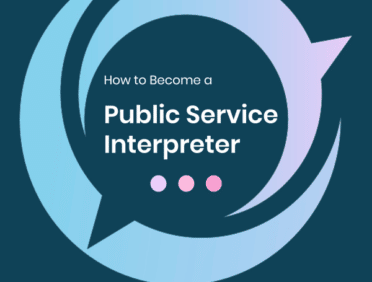Filter by
The Vital Role of Medical Interpreters
Bridging Linguistic Divides in Healthcare
Effective communication is essential, particularly in the healthcare industry, to provide the community with the appropriate degree of service and crucial information. Individuals with poor English proficiency, as well as those who are deaf or hard of hearing, may struggle to obtain appropriate healthcare services if suitable linguistic support is not provided. Medical interpreters can help bridge linguistic gaps and ensure fair access to healthcare for all.
The Role of Medical Interpreters
Medical interpreters act as linguistic liaisons between healthcare practitioners and patients, ensuring clear and accurate communication in a variety of healthcare settings. Whether during medical consultations, tests, diagnostic procedures, or treatment talks, interpreters help to guarantee that patients understand their diagnosis, treatment options, and healthcare rights.
By presenting information accurately, interpreters enable patients to make informed decisions regarding their health and well-being.
The Making of Proficient Interpreters
Being a skilled medical interpreter involves more than just bilingualism. To successfully negotiate complicated healthcare interactions, interpreters receive extensive training in interpreting methodologies, medical terminology, and cultural competency. Many interpreters have qualifications from respected organisations like Learn Q or the Chartered Institute of Linguists (CIOL) , which validate their abilities and knowledge in medical interpreting.
Complexities in Healthcare Communication
While medical interpreters play an important role, they also face unique problems and drawbacks. Interpreters must handle high-pressure situations, manage sensitive information confidentially, and maintain cultural awareness in a variety of healthcare settings. Additionally, interpreters may face problems such as language hurdles, specialised terminology, and emotionally charged circumstances, which necessitate perseverance, adaptation, and professionalism.
The Future of Medical Interpreting
As healthcare systems expand and vary, there is an increased requirement for trained medical interpreters. With an increasingly diversified patient population and regulatory requirements for language access, the demand for skilled interpreters has never been stronger. Medical interpreting is more than just language; it is also about overcoming cultural gaps, supporting patient-centred care, and guaranteeing health equity for all people, regardless of linguistic or cultural background.
Frequently Asked Questions (FAQs)
A medical interpreter is a professional linguist who helps healthcare providers communicate with patients who speak little English or are deaf or hard of hearing. Their work is critical in providing proper comprehension and communication during medical consultations, examinations, and treatments, thereby supporting patient safety, informed decision-making, and healthcare access.
Medical interpreters in the United Kingdom follow the NHS Language Services Framework’s high standards, which ensure linguistic accuracy and cultural competence.
To begin a career as a medical interpreter in the NHS in the United Kingdom, persons often receive formal training in interpreting techniques, medical terminology, and cultural competency, meaning they can achieve qualifications such as the Level 3 Certificate in Community Interpreting from renowned institutions or organisations, such as Learn Q. Once qualified, acquiring practical experience through volunteering, or entry-level work can improve one’s chances in this sector.
The salary range for medical interpreters in the UK varies depending on experience, language competency, geographical area, and employment status (freelance or employed). On average, medical interpreters can expect to earn between £20,000 and £35,000 per year, with the possibility of higher pay for those with specialised talents or languages in demand.
While both medical translators and interpreters work with language, their responsibilities differ greatly. Medical translators focus on written communication, translating medical documents, reports, and records from one language to another with precision and accuracy. Medical interpreters, on the other hand, specialise in oral communication, allowing healthcare professionals to communicate with patients or their families in real time during medical appointments, consultations, or crises.
Becoming a licenced medical interpreter in the UK normally entails completing necessary training programmes approved by professional bodies such as Learn Q. These programmes frequently include information on medical terminology, interpreting procedures, ethics, and cultural sensitivity. Following completion, aspiring interpreters need to complete certification exams, such as the Level 3 Certificate in Community Interpreting, to verify their abilities and competency.
Yes, working as a hospital interpreter in the UK normally requires people to have the necessary qualification (the Level 3 Certificate in Community Interpreting) that demonstrates their skill in interpreting procedures, medical terminology, and cultural understanding. Certification programmes such as the Level 3 Certificate in Community Interpreting offered by Learn Q are widely accepted in healthcare contexts, guaranteeing that interpreters fulfil established levels of competence and professionalism, and represent a low risk to service users.
The hourly rate charged by a medical interpreter in the UK varies according to language proficiency, specialisation, location, and mode of service (on-site or remote). Medical interpreters often get paid between £15 and £50 per hour for their services, with rates potentially higher for urgent or specialised assignments.
Yes, working as a medical interpreter in the UK can be financially rewarding in the long run, particularly for competent specialists with skills in in-demand languages or dialects. As healthcare services prioritise linguistic access and cultural competence, qualified interpreters can anticipate continuous demand for their services, resulting in steady employment possibilities.
Globalisation, multiculturalism, and legislative requirements for language access in healthcare settings all contribute to the continually high need for medical interpreters in the United Kingdom. With an increasingly diversified patient population and a growing recognition of the value of efficient communication in healthcare, the demand for skilled medical interpreters is projected to rise in the future.
A job as a medical interpreter provides stability and advancement potential, especially for those with specialised language skills and qualifications. Healthcare professionals rely on qualified interpreters to ensure accurate communication and quality care for patients from various linguistic and cultural backgrounds, resulting in a continual need for professional interpreting services across several healthcare settings.
Continuous professional growth and respect for ethical norms help to ensure the long-term viability and stability of a career in medical interpreting.
Yes, the NHS offers language interpreting services to help healthcare workers communicate with patients who have poor English competence or are deaf or hard of hearing. Patients can obtain these services by telling healthcare personnel about their language needs during consultations or by calling NHS language support services ahead of time to arrange for interpreting assistance.
The typical salary for British Sign Language (BSL) interpreters in the UK varies according to experience, certification, and demand for specialised abilities. BSL interpreters often charge hourly rates ranging from £25 to £70 or more, with higher rates possible for complex assignments or specialised domains such as medical or legal interpreting.
Translators and interpreters’ income potential in the UK varies depending on a number of things. Interpreters typically earn higher hourly rates than translators because of the real-time nature of their work and the specialised abilities required for efficient communication in a variety of circumstances.
However, translators may be able to secure higher volume work, particularly for major translation projects or recurring contracts, which can have an impact on their overall pay.
Working as a medical interpreter involves particular problems and disadvantages, including the necessity for linguistic correctness and cultural sensitivity in high-pressure settings like hospitals or clinics. Other problems may include deciphering technical medical terminology, maintaining impartiality and confidentiality, dealing with difficult or emotionally charged circumstances, and ensuring efficient communication among parties from various backgrounds and communication styles.
Medical interpreters may be needed in any healthcare setting, including medical consultations, examinations, diagnostic procedures, treatment talks, mental health assessments, informed consent processes, and emergencies. They serve an important role in enabling communication between healthcare providers and patients who speak limited English or are deaf or hard of hearing, resulting in correct understanding and informed decision-making.
Essential qualities and skills for proficient interpreters include:</b>
- Excellent linguistic skills in both the source and target languages.
- Cultural competency involves sensitivity to different cultures and communication methods.
- Effective communication and interpersonal abilities.
- Active listening and understanding skills.
- Quick thinking and problem-solving abilities.
- Professionalism, ethics, and confidentiality.
- Adaptability and resilience in changing settings.
- Knowledge of specialised terminology in related fields (such as medicine, law, and technology).
The length of training and certification programmemes for translators or interpreters varies according to individual circumstances, programme needs, and the desired degree of skill. Formal training programmes can last from a few months to many years and include coursework on language skills, translation and interpreting procedures, cultural competency, and specialised terminology. Certification methods, such as practical tests or portfolio assessments, may extend the entire training and qualification term.
Interpreters are grouped into several categories based on their specialisation and the nature of their work.
Some common types of interpreters include:
Consecutive interpreters: Listen to the speaker and translate the message into the target language at pauses or intervals. This strategy is commonly employed in hospitals, government offices and social services.
Simultaneous interpreters: Interpret the message in real time as the speaker speaks, delivering the message almost simultaneously in the target language. This strategy is frequently used in courts, conferences, major events, and live broadcasts.
Escort interpreters: Accompany individuals or groups on tours, appointments, or visits and provide translating services as needed in diverse scenarios.
Conference interpreters: Specialise in translating difficult and technical information at conferences, seminars, and multilingual events, guaranteeing clear communication among participants with diverse linguistic backgrounds.
Each sort of interpreter has unique roles, tactics, and talents that are customised to certain situations and communication requirements.
Yes, remote interpreting, including work-from-home arrangements, has grown in popularity, thanks to technological developments and communication capabilities. Many interpreters now work remotely using video conferencing platforms, phone conferences, or internet meeting tools.
Remote interpreting provides flexibility, convenience, and accessibility for both interpreters and clients, allowing them to communicate across geographical boundaries without the necessity for in-person sessions.
BSL interpreters in the NHS serve an important role in improving communication between healthcare personnel and deaf or hard-of-hearing patients who communicate primarily using British Sign Language. Their tasks include accurately interpreting medical information, directions, and discussions during appointments, consultations, treatments, and other healthcare encounters.
BSL interpreters also ensure that Deaf patients have equitable access to healthcare services, are aware of their rights and options, and may actively participate in their care decisions.
BSL interpreters are essential in the NHS because they facilitate efficient communication between healthcare professionals and deaf or hard-of-hearing patients, providing access to quality healthcare services and fair treatment. BSL interpreters bridge the communication gap, allowing Deaf people to express their healthcare requirements, concerns, and preferences, thereby improving patient safety, satisfaction, and outcomes.
BSL interpreters help to fulfil the NHS’s commitment to diversity, inclusion, and accessibility for all patients, regardless of communication preferences or skills.
Registering as an interpreter in the UK typically involves several steps, including:
Qualifications and Training: Obtain the necessary skills and certifications for interpreting methodologies, language fluency, and cultural competency. Completing training programmes /courses anjd qualifications approved by professional organisations such as Learn Q and Gatehouse Awards is necessary.
Experience: Volunteer work, or entry-level roles in interpreting can help you develop your abilities and become familiar with diverse interpreting environments.
Certification: Obtain the Level 3 Certificate in Community Interpreting certification from recognised organisations or regulatory agencies, such as Learn Q.
Application Process: Submit an application to Language Service Providers (LSPs) aka interpreting agencies, along with proof of qualifications, training, and experience. As part of the registration process, you may be required to complete exams, background checks, and interviews.
Professional Standards: To retain your registration and certification status, follow professional standards, codes of conduct, and continuous professional development (CPD) criteria. This could include attending training classes, workshops, or conferences to stay current on industry advances and best practices.
Continued Professional Development (CPD): Participate in continuing professional development programmes or conduct your own research to improve interpreting skills, knowledge, and proficiency, ensuring that you remain competent and effective in your work.
You would only be able to take a Level 7 course in a university. Usually, the highest level completed and required for work in the UK is a Level 6 and the most common is the Diploma in Public Service Interpreting (DPSI). However, this level is only suitable for experienced, professional interpreters. if you wish to start an interpreting career the best place to start is by completing the Level 3 Certificate in Community Interpreting, such as the one provided by Learn Q.
Yes, interpreting services are provided for NHS 111, the UK’s non-emergency medical helpline, to support people who speak little English or are deaf or hard of hearing. Patients can request interpreter services by alerting NHS 111 call takers about their language needs or communication preferences at the start of the conversation.
Call handlers can arrange for interpreting support in the required language or manner of communication, ensuring clear communication and understanding throughout the consultation process.
While specific estimates may vary, it is difficult to provide an accurate estimate of the overall number of interpreters working in the UK due to factors such as freelance employment, varying levels of official registration or certification, and the diversity of languages and specialties represented. However, numerous professional organisations, regulatory agencies, and business organisations may collect information on registered or certified interpreters in specific industries or language combinations.
BSL interpreters may determine their rates for services based on several factors, including:
Hourly or daily rates: For brief tasks, BSL interpreters may charge an hourly rate, whereas longer sessions or contracts may require a daily fee.
Experience and qualifications: Experienced interpreters or those with specialised credentials may seek more pay due to their expertise and proficiency.
Travel and expenses: Interpreters may account for travel time, transportation costs, and other expenses incurred when delivering on-site translating services.
Demand and availability: Rates may vary according to the demand for BSL interpreting services, the availability of interpreters in a specific region or language combination, and market conditions.
Complexity and urgency: Interpreters’ prices may be adjusted for jobs with complicated subject matter, tight deadlines, or additional preparation time required.
BSL interpreters strive to set competitive rates that reflect their expertise, qualifications, and the value of their services in the interpreting industry.
Working hours for interpreters might vary depending on the type of interpreting, client requirements, and schedule preferences. Interpreters may work flexible hours, including evenings, weekends, and holidays, to accommodate appointments, meetings, or events scheduled at different times. Interpreters can also work part-time or full-time as independent contractors.
The nature of interpreting employment, whether on-site or remote, may also have an impact on working hours, with some interpreters delivering services outside of regular office hours to fulfil client demands and maintain language support accessibility.
Interpreters should consider several factors when determining their service charges, including:
Experience and Qualifications: Experienced interpreters may charge a premium rate due to their expertise and skill.
Language Combination: Rates may vary according to the demand for interpreters in particular languages or language combinations. Interpreters who operate in rare or less commonly spoken languages may charge higher prices due to restricted availability.
Type of Interpreting: Different styles of interpreting, such as sequential, simultaneous, or specialised professions like legal or medical interpreting, may demand different prices depending on the intricacy, preparation time, and skill required.
Location: Rates can be determined by regional factors such as cost of living, market demand, and industry norms in a certain geographic area.
Mode of Service: On-site interpreters’ charges may include travel time, transportation costs, and other expenses, but remote interpreters’ rates may vary depending on technology usage and convenience.
Urgency and Complexity: Interpreters may charge more for urgent or last-minute jobs, as well as projects with difficult subject matter or specialised terminology that necessitates additional preparation or research.
Industry Standards: Interpreters may conduct research on industry standards, market rates, and competition pricing to ensure that their fees are competitive and reflect the value of their skills and knowledge.
Client Relationship: Long-term clientele or repeat business may be eligible for discounts or loyalty incentives in order to build continuous partnerships and client satisfaction.
Taking these elements into account, interpreters can set fair and competitive fees that correctly reflect the value of their services and experience.
Yes, there may be shortages of qualified interpreters in certain languages or regions due to various factors such as:
Demand-Supply Imbalance: High demand for interpreters in specific languages or language combinations may exceed the supply of trained specialists, resulting in shortages in those areas.
Less Commonly Spoken Languages: Languages with fewer speakers or limited resources for interpreting training may have a scarcity of skilled specialists, especially in areas with varied linguistic populations.
Remote or Rural Areas: Geographic restrictions can contribute to interpreter shortages in remote or rural areas.
Specialised Fields: Specialised fields such as legal, medical, or technical interpreting may face a shortage of trained experts with relevant competence, particularly for difficult or specialist topics.
Efforts to address interpreter shortages may include increasing training programmes, offering incentives for interpreters to work in underserved areas or languages, and encouraging diversity and inclusion in the interpreting field.
Age is often not an important consideration when selecting a career as an interpreter because the field values abilities, experience, and certifications regardless of age (although some clints may not allow interpreters aged younger than 18 due to the topics discussed and confidential nature of assignments). Interpreting is a job that embraces people of various ages and backgrounds, and there is flexibility in pursuing interpreting training and certification.
However, aspiring interpreters must have strong language skills, cultural competence, and the capacity to successfully communicate meaning across languages. Furthermore, older people can add substantial life experience, maturity, and professional skills to the interpreting field, which can increase their efficacy and credibility as interpreters.
Success as an interpreter is more dependent on your ability, long-term commitment to continual learning and development, and willingness to satisfy the demands of clients and stakeholders of all ages.











